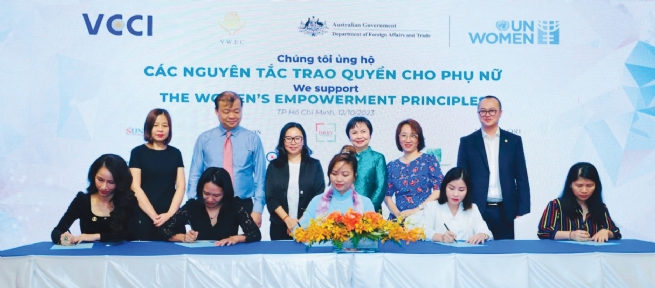Fostering Gender Equality, Enhancing Competitiveness for Women-Owned Businesses
The Vietnam Women’s Entrepreneurs Council (VWEC), under the auspices of the Vietnam Chamber of Commerce and Industry (VCCI), recently collaborated with the United Nations Entity for Gender Equality and the Empowerment of Women (UN Women) and the Joint Stock Commercial Bank for Investment and Development of Vietnam (BIDV) to hold a workshop on “Solutions to empower women-owned businesses and gender-responsive businesses to participate in the supply chain and promote the implementation of gender-responsive procurement”.
The workshop featured experts who suggested various initiatives and solutions to enhance the competitiveness of women-owned businesses and support them in accessing the market and joining the supply chain.

Vietnamese businesses sign the CEO's Statement of Support of the Women's Empowerment Principles (WEPs), expressing their commitment to advancing women’s empowerment in the workplace in the market and in the community
Mr. Nguyen Hoa Cuong, Vice President of the Central Institute for Economic Management (CIEM) under the Ministry of Planning and Investment (MPI), said that the rate of women-owned businesses in Vietnam has increased rapidly, especially in the small and medium-sized enterprises (SMEs) sector. According to CIEM statistics, more than 20% of SMEs are currently owned by women and 51% of Vietnamese businesses have women in the ownership structure, which is higher than in other countries. However, he also pointed out that women-owned businesses are mostly at the lowest levels of the supply chain in many industries and face difficulties in meeting orders from large companies. He explained that this situation is due to their low competitiveness, as many women are engaged in lower-skilled roles; their insufficient finance; and their limit ed capacity in enterprise administration and access to information and technology. He added that women also have to bear the so-called “dual responsibility” of developing their business and taking care of their families, while having limit ed access to resources. He noted that there is a lack of business support networks tailored to women entrepreneurs and an insufficient focus on gender-balanced intervention policies by enterprise leaders in Vietnam.
To overcome these barriers, Cuong suggested that, besides the support of the government and domestic and foreign economic organizations, women entrepreneurs themselves should also actively seek and learn information about government-backed policies, programs and projects for business development; participate in dialogues and regularly report difficulties and propose solutions through single-window divisions of branches and localities.
He also advised businesswomen to actively join networks of women entrepreneurs’ associations, s, and clubs to acquire business and career knowledge, access funding support and credit, and help other businesses; actively attend training courses, consultations, information, and legal knowledge sessions; and contact supporting intermediaries such as business incubators, technical support centers, co-working spaces, startup accelerators, and investment funds.
Ms. Caroline Nyamayemobe, Acting Head of the Office of UN Women Vietnam, said that evidence shows that countries with greater gender equality experience faster economic growth and increased competitiveness. She emphasized that prioritizing procurement from women-owned and gender-responsive businesses is a catalyst for women’s economic empowerment and gender equality in Vietnam. She also said that this approach enhances the reputation and competitive edge of enterprises during the integration process.
| At the workshop, 24 Vietnamese businesses endorsed the CEO's Statement of Support of the Women's Empowerment Principles (WEPs), expressing their commitment to advancing women’s empowerment in the workplace, in the market and in the community. With these new signatories, the total number of Vietnamese businesses endorsing and supporting the WEPs now stands at 174. |
Ms. Nguyen Kim Lan, Manager of the Program for Advancing Women Economic Empowerment in Vietnam - WRT (UN Women Vietnam), agreed with the previous speakers and said that UN Women conducted a survey on 350 organizations and businesses. The survey result showed that more than 70% of respondents believed that gender-responsive procurement increases supplies and reduces supply disruptions; 74% believed that gender-responsive procurement strengthens the company’s brand and reputation; 70% applied gender-responsive procurement to enhance innovation, agility and flexibility; 76% agreed that gender-responsive procurement improves employee satisfaction and retains talent; 68% used gender-responsive procurement to learn more about their suppliers and explore potential risks and new opportunities in the supply chain. She added that businesses with gender-responsive procurement will enjoy many practical benefits such as increasing revenue and reducing shopping spending, expanding supply range and resilience; fostering innovations and adaptability to enable better responses to customer needs; enhancing labor productivity, innovation, and creativity; creating diversified products and services to meet different customer needs; boosting brand reputation and corporate images; reducing the risk of conflicts and disputes. “We can create equal market opportunities for women by diversifying suppliers through gender-responsive procurement in Vietnam. If women are equal in the economy, it will help promote GDP growth,” she emphasized.
Mr. Nguyen Cao Minh, Deputy Director of Corporate Banking Department, BIDV, also shared his perspective from a business angle. He said that BIDV always pays special attention to women-owned SMEs with a series of comprehensive solutions, as part of its effort to promote gender equality as directed by the government. He mentioned that BIDV has launched large-scale preferential interest credit packages to support SMEs, including women-owned ones; deployed comprehensive financial programs for women-owned SMEs; combined a non-refundable aid worth US$5 million from the Women Entrepreneurs Finance Initiative and VND3,000 billion from BIDV; carried out the Digital Transformation Program with SMEs (SME Digitrans) to provide free accounting and business management software to businesses. He also introduced the “SMEASY digital platform - Comprehensive solutions for SMEs” as a tool to help improve the competitiveness of SMEs, including women-owned ones.










